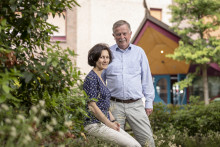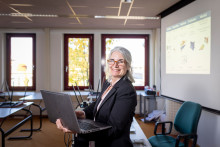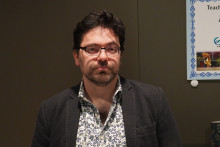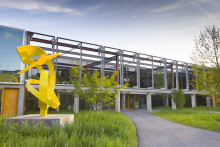50 years of urban studies
Urban Studies at ITC is celebrating its 50th anniversary this year. To commemorate the occasion, the faculty is organizing a symposium held on the 13th and 14th of June. The two-day event will also include a farewell lecture by professor Martin van Maarseveen, Chair in Management of Urban-Regional Dynamics, and an inaugural lecture by professor Karin Pfeffer, newly appointed Chair in Infrastructuring Urban Futures.
You are both experts in the field of Urban Studies. Why is it important for scientists to focus on the topic of cities?
Van Maarseveen: ‘We are living in the age of urbanization. You could say that we are experiencing the urban revolution, the third big revolution in the history of humankind. First came the cognitive revolution with the evolution of the homo sapiens in a society of hunters, then the agricultural revolution and now urbanization. Currently, more than half of the world’s population lives in cities. And this number will only increase.’
Pfeffer: ‘It is estimated that 68% of the population will live in cities by 2050. Many of them in Africa and Asia, in China and India in particular.’
Van Maarseveen: ‘Good that you know the exact numbers. Yes, people tend to cluster. There are many benefits of living in cities – it’s easier to generate income, and here are most of the facilities. People can work, study, have fun, all in one place. But all of this also comes with negative impacts: pollution, congestion, slums, crime, a lot of waste and energy.’
Pfeffer: ‘It requires a lot of resources indeed. Living in cities is something people want, but there are consequences we need to think about. We need to think about the people-urban environment interaction, hence urban studies. There are different understandings of what Urban Studies is. Some see it as a research field focused on people in cities, some focus on the technical aspects. Here at ITC, we combine it all. Our research isn’t purely quantitative, qualitative or spatial. It’s an integrated study.’
Van Maarseveen: ‘That is important because we are talking of a very complicated phenomenon. We often talk of wicked problems, problems that can’t really be solved. We try to understand the complex fabric of cities, see how it works and how we could improve it. There are many points of view. First, the focus was on economic growth of cities, then on sustainability and now we focus on climate change, on making cities resilient.’
ITC is celebrating 50 years of Urban Studies this year. Tell us more about how the field has developed over the years.
Pfeffer: ‘It started with a key figure of Victor Polle who established the field at ITC. Since then, there has been increasingly more focus on collaborative processes. Meaning, not just doing research from a distance, but including stakeholders at the location.’
Van Maarseveen: ‘Some of the key topics currently are resilience and equity in cities.’
Pfeffer: ‘And also climate change, sustainable transport, digital technologies, energy transitions…’
Van Maarseveen: ‘And of course, like the rest of ITC, we mainly work in the Global South.’
Pfeffer: ‘I forgot infrastructure!’
Van Maarseveen: ‘That’s your field of expertise! So yes, also important. We concentrate on all of these things because many cities are currently in the premature stage of development. Therefore knowing what might come can help them. It’s difficult to make a transition in a fully developed modern city, so it’s important to adapt as soon as possible. It’s difficult, though. We do research and we can show them not to make the same mistakes as we did, although that sounds rather colonial. They need to create their own awareness and urgency. They need to take their future in their own hands. An interesting example is our alumnus Alphonse Nkurunziza who will speak at the symposium this week. He is the City Engineer of Kigali, the capital city of Rwanda. He is engaged with modernizing the city’s transport, creating car free zones, bicycle tracks, BRT systems etc. He is implementing everything we taught him here. And I notice he is making progress.’
Pfeffer: ‘Hopefully you taught him well.’

Speaking of the symposium, Martin you will present your valedictory lecture, saying farewell to ITC. Can you look back at your time here and tell us something about your lecture?
Van Maarseveen: ‘My background is in transport, in Civil Engineering. I worked as a transport planner and traffic engineer for a while, but I noticed that problems we were solving in the Netherlands were small in comparison to the rest of the world. I thought that if we could implement our findings about integrated spatial planning on other continents, it would make a much bigger impact. That was my personal motivation for switching to ITC ten years ago. I’m very pleased I made the move. It was very exciting, although it was difficult to leave my baby behind – I was one of the founding fathers of Civil Engineering at the UT. However, ITC offers such great facilities. Remote sensing data can help us create trajectories of how cities have developed. And I believe in the importance and relevance of multidisciplinary research. In my lecture I will talk about how Urban Studies in transport research has developed over the years and what its main results are, how science has evolved and what tools we can use nowadays. I will look back, while Karin will look into the future.’
And what does the future hold? Karin, what will you discuss during your inaugural lecture?
Pfeffer: ‘I have always focused on the interface between geo-spatial technologies and Urban Studies. For instance, I have done projects on mapping population characteristics through urban statistics. Doing so allows you to spot patterns which can give valuable signals to policy makers. I believe we need to combine various data sets to get a better understanding of the complex urban processes. We can’t just look through satellites, rely on sensors or qualitative data. In my position, I want to continue with combining different data sources. I also want to reach out and have an interactive process with local stakeholders and citizens. I’m mainly interested in infrastructuring: seeing how we can build and sustain a long-term engagement from all parties. Infrastructure is the substrate upon which things can run on, like train tracks. But you need a lot more than just train tracks for the infrastructure to work. You need the train, the conductor, passengers, information, schedules. It’s a relational system. That’s also true for cities. Urban infrastructure is about mutual adjustments of all these elements: the infrastructure itself, citizens, companies, services, environment, developers and so on. You can plan infrastructure, but people shape it through their use. And how they use it changes over time, meaning you might need to adjust the infrastructure again. See, a mutual adjustment.’
Van Maarseveen: ‘Everything is connected. Which is why we are so lucky here at ITC to work with people from many different disciplines.’
Martin, you will officially retire soon. Is there something you hope that Karin and your other colleagues will achieve in the field of Urban Studies?
Van Maarseveen: ‘I hope they will continue with what we have started in the last ten years. People at this department are truly motivated and they don’t work on individual islands, it’s a real team. I hope they will generate even more impact and that they can help to achieve the Sustainable Development Goals.’







